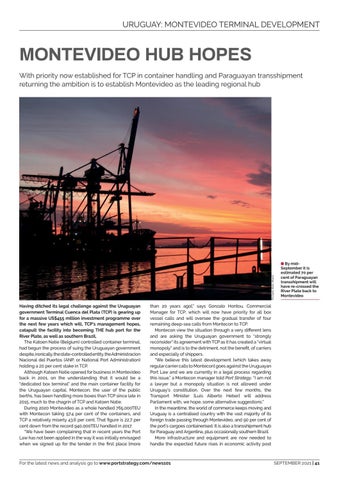URUGUAY: MONTEVIDEO TERMINAL DEVELOPMENT
MONTEVIDEO HUB HOPES
2KEVWTG 4QD 9CTF
With priority now established for TCP in container handling and Paraguayan transshipment returning the ambition is to establish Montevideo as the leading regional hub
Having ditched its legal challenge against the Uruguayan government Terminal Cuenca del Plata (TCP) is gearing up for a massive US$455 million investment programme over the next few years which will, TCP’s management hopes, catapult the facility into becoming THE hub port for the River Plate, as well as southern Brazil, The Katoen Natie (Belgium) controlled container terminal, had begun the process of suing the Uruguayan government despite, ironically, the state-controlled entity, the Administracion Nacional del Puertos (ANP, or National Port Administration) holding a 20 per cent stake in TCP. Although Katoen Natie opened for business in Montevideo back in 2001, on the understanding that it would be a “dedicated box terminal” and the main container facility for the Uruguayan capital, Montecon, the user of the public berths, has been handling more boxes than TCP since late in 2015, much to the chagrin of TCP and Katoen Natie. During 2020 Montevideo as a whole handled 765,000TEU with Montecon taking 57.4 per cent of the containers, and TCP a relatively miserly 43.6 per cent. That figure is 22.7 per cent down from the record 940,000TEU handled in 2017. “We have been complaining that in recent years the Port Law has not been applied in the way it was initially envisaged when we signed up for the tender in the first place [more
8 By midSeptember it is estimated 70 per cent of Paraguayan transshipment will have re-crossed the River Plate back to Montevideo
than 20 years ago],” says Gonzalo Hontou, Commercial Manager for TCP; which will now have priority for all box vessel calls and will oversee the gradual transfer of four remaining deep-sea calls from Montecon to TCP. Montecon view the situation through a very different lens and are asking the Uruguayan government to “strongly reconsider” its agreement with TCP as it has created a “virtual monopoly” and is to the detriment, not the benefit, of carriers and especially of shippers. “We believe this latest development [which takes away regular carrier calls to Montecon] goes against the Uruguayan Port Law and we are currently in a legal process regarding this issue,” a Montecon manager told Port Strategy. “I am not a lawyer but a monopoly situation is not allowed under Uruguay’s constitution. Over the next few months, the Transport Minister [Luis Alberto Heber] will address Parliament with, we hope, some alternative suggestions.” In the meantime, the world of commerce keeps moving and Uruguay is a centralised country with the vast majority of its foreign trade passing through Montevideo, and 90 per cent of the port’s cargoes containerised. It is also a transshipment hub for Paraguay and Argentina, plus occasionally southern Brazil. More infrastructure and equipment are now needed to handle the expected future rises in economic activity post
For the latest news and analysis go to www.portstrategy.com/news101
SEPTEMBER 2021 | 41














